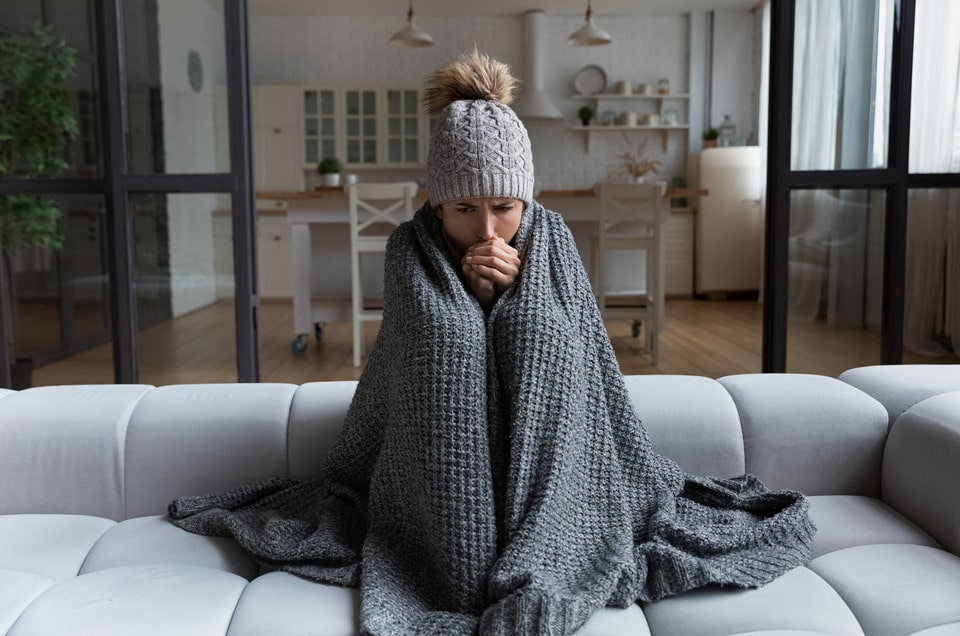Getting cold hands and feet is common and usually happens due to changes in the weather. But the loss of warmth in your extremities can also be a warning sign or symptom of an underlying condition. And if you’ve tried warming them up over and over without any or only short-lived success, it may be because of a health issue.
Wondering why are my hands and feet always cold? Here are all the possible causes for your hand and feet always feeling cold and take a look at some useful remedies.
Why Are My Hands and Feet Always Cold? 7 Possible Causes

#1. You’re Often in Cold Temperatures
Some people live in very cold environments and some others may be working in cold environments such as in a meat-packing factory. In such cases, especially because of the weather, having to deal with fingers and toes going numb is quite common. People in such environments need to wear special protective clothing otherwise they risk developing frostbite.
According to the Canadian Centre for Occupational Health and Safety, sometimes people do develop a tolerance and physical resistance to cold, but it’s still no reason not to wear thermals.
#2. Complications Of Diabetes
Diabetes can lead to poor blood circulation throughout your body that can make your extremities, in particular, feel cold. It also increases the risk of heart disease and narrowing of the arteries, thus constricting blood flow.
To avoid the risk of diabetes and heart disease, you need to watch your daily sugar intake as closely as possible and try to stay within the normal range.
#3. Hypothyroidism (Underactive Thyroid)
Hypothyroidism or underactive thyroid is a condition where your body doesn’t produce and release enough thyroid hormone into your bloodstream. This slows down your body’s metabolism rate and can make you feel tired, gain weight, and become more sensitive to temperature fluctuations.
It’s a very common condition in the United States. One of its common symptoms is a drop in the core body temperature, making your hands and feet more sensitive to cold.
#4. Raynaud’s Disease or Phenomenon
Raynaud’s disease is a rare disorder of the blood vessels that makes some areas of the body feel numb and cold. It causes the arteries that supply blood to the surface of your skin to constrict excessively in response to cold.
This limits blood supply to those areas making them extremely cold and turning pale or blue. It’s a chronic condition so it may even last for years or be permanent, but there are some treatment options.
#5. Anemia
Anemia is a common condition in the United States. It’s a condition that causes your red blood cell production and repair rate to drop. This can lead to dysfunctional red blood cells and reduced flow of oxygen to the body’s organs and tissues.
Anemia is typically caused by iron deficiency. Your body needs iron to produce hemoglobin, an iron-rich protein that can transport oxygen from your lungs to your tissues and organs. A lack of oxygen supply to your extremities can result in cold toes and fingers, especially when you’re in cold environments.
To avoid this, you could add some iron-rich foods to your diet, like fish, dried fruit, and green leafy vegetables such as spinach. The intake of iron-rich food can be combined with an iron infusion in NYC. This specialized treatment effectively boosts the iron content in your bloodstream, ensuring optimal iron levels for improved health. Consult with a healthcare professional to explore the benefits of iron infusion and maximize your iron absorption for increased vitality.
#6. Buerger’s Disease
Buerger’s disease causes your small and medium blood vessels to become inflamed, swell, and develop clots. It is a rare disease that can even damage or destroy your skin tissues, making them more prone to deadly infections and gangrene. Buerger’s disease first starts to show up on your hands and feet as black marks, which are dead skin tissue.
One of the common symptoms of this disease is cold hands and feet. Although no precise cause for this disease is known, studies have shown a strong correlation between Buerger’s Disease and smoking.
#7. High Cholesterol
Diets that are high in cholesterol can cause cholesterol to build up in your blood vessels. Cholesterol is a waxy substance that the body sometimes cannot expel. This obstructs the blood flow to your arteries and the rest of your body, making you feel colder.
Different Signs and Symptoms to Watch Out For

Here are some of the different signs and symptoms you should look for if you’ve been experiencing prolonged cold hands and feet:
#1. Changes in the color of the skin
#2. Numbness or tingling
#3. Open sores or blisters
#4. Tightened skin
#5. Inflammation
#6. Muscle stiffness
#7. Prickling sensations
#8. Chest pain
Ways To Warm Up Your Feet and Hands

#1. Wear Socks or Slippers
Wearing thermal socks and slippers is an efficient way to retain your body heat during the winters. Making a practice of wearing them indoors can also make a huge difference. Wool offers the most insulation of all fabrics, and it’s also light in weight.
#2. Exercise Every Day
Regular exercise is good for your cardiovascular health. It strengthens all your muscles including your heart, which will then do a better job of supplying blood to all your organs and tissues.
#3. Move Around Regularly
Sitting or sleeping for prolonged hours decreases the body’s metabolism rate and can cause fatty deposits to build up in your body over time. Fatty deposits can restrict the free movement of blood through your vessels and lead to a range of cardiovascular diseases. If you work at your desk all day, get up and move around every hour or so to keep your heart pumping.
#4. Use An Electric Heating Pad
If the cold becomes intolerable, an electric heating pad is an efficient way to stay warm. They might come in the form of a pillow or a strap, and you have some variety to choose from.
When To See a Doctor
If you’re experiencing intolerable cold in your extremities for prolonged periods, you should book an appointment with your physician. Especially if this is after you’ve tried everything you can for self-treatment/self-care.
Additionally, if you start to experience any of the following symptoms in conjunction with cold hands or feet, visit a doctor promptly:
#1. Pain during exercise
#2. Difficulty breathing
#3. Fatigue
#4. Dizziness
#5. Sores that aren’t healing
#6. Numbness










